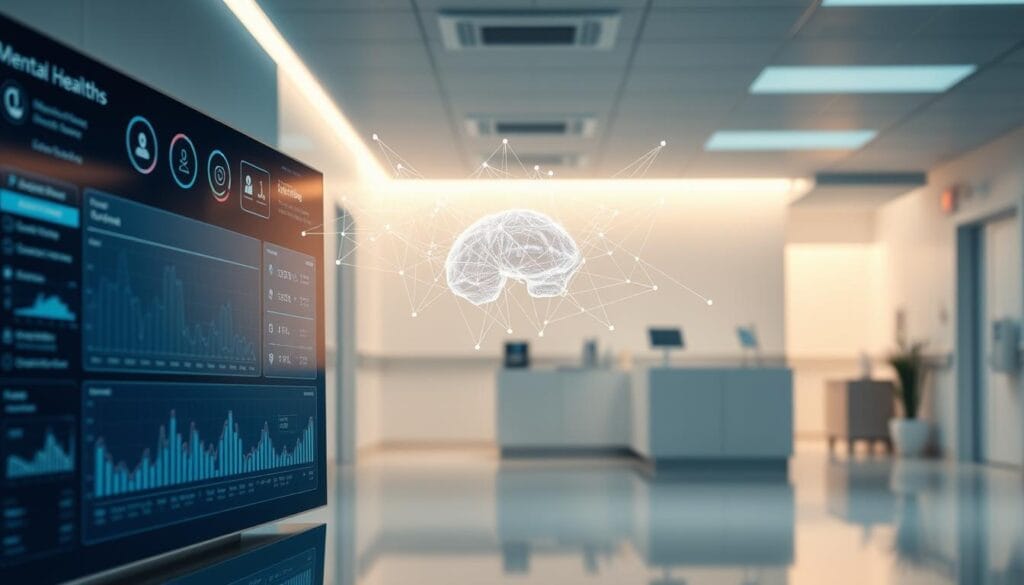“Technology is nothing. What’s important is that you have faith in people, that they’re basically good and smart, and if you give them tools, they’ll do wonderful things with them.” – Steve Jobs. This quote resonates deeply as artificial intelligence continues to transform mental health care, offering innovative tools to support individuals in need.
Artificial intelligence is revolutionizing how mental health care is delivered. From advanced diagnostics to personalized treatment plans, AI agents are making a significant impact. Models like EMPaSchiz achieve up to 90% accuracy in classifying schizophrenia, showcasing the potential of these technologies1.
AI-driven applications analyze patient data to predict risks and monitor real-time health metrics. These tools provide immediate coping strategies and improve accessibility to care2. By integrating natural language processing, AI chatbots like MYLO offer real-time assistance, enhancing mental well-being1.
As mental health care evolves, AI is paving the way for more efficient and effective interventions. Discover how these advancements are reshaping the future of mental health support here.
Key Takeaways
- AI models show high accuracy in diagnosing mental health conditions1.
- Real-time monitoring through AI improves decision-making in care2.
- Chatbots provide immediate support and coping mechanisms1.
- Personalized treatment plans enhance effectiveness2.
- AI reduces healthcare costs while improving accessibility1.
Introduction to AI in Mental Health

Artificial intelligence is reshaping the landscape of healthcare, particularly in mental health. From early rule-based systems to advanced machine learning models, AI has evolved significantly. Its applications now span diagnostics, treatment planning, and patient support, offering new hope for those in need.
Defining Artificial Intelligence in Healthcare
Artificial intelligence refers to systems that mimic human intelligence to perform tasks like data analysis, pattern recognition, and decision-making. In healthcare, AI tools analyze vast datasets to identify trends and predict outcomes. For example, machine learning algorithms can detect mental health conditions with up to 98% accuracy3.
These technologies are not just about automation. They enhance human capabilities, enabling clinicians to make more informed decisions. AI-powered tools like e-triage systems achieve 93% accuracy in diagnosing conditions such as PTSD and anxiety4.
The Importance of Mental Health Services
Mental health is a critical component of overall well-being. Yet, over 60 million Americans face mental health challenges, with 25% unable to access care due to cost4. This gap highlights the need for innovative solutions.
AI bridges this gap by offering accessible, cost-effective services. Chatbots provide 24/7 support, while predictive analytics enable early intervention5. These tools not only improve outcomes but also reduce the burden on healthcare providers.
By integrating artificial intelligence, mental health services become more efficient and personalized. This transformation ensures that individuals receive the care they need, when they need it.
History and Evolution of AI in Mental Health

The history of AI in mental health is a story of innovation and adaptation. From its early beginnings to modern applications, artificial intelligence has steadily evolved to address critical challenges in health care. This journey is marked by key milestones that have shaped its role in mental health support and therapy.
One of the earliest breakthroughs was the creation of ELIZA in 1966, the first chatbot designed to simulate conversation. While rudimentary by today’s standards, ELIZA laid the groundwork for AI’s role in mental health care6. Its ability to mimic human interaction sparked interest in using technology for therapy and support.
Pioneers like Alan Turing and John McCarthy also played pivotal roles. Turing’s concept of machine intelligence and McCarthy’s development of Lisp programming language were foundational. These contributions enabled the gradual integration of AI into health care, though adoption in mental health was slow initially7.
Early challenges included limited computational power and skepticism about AI’s capabilities. However, as technology advanced, so did its applications. Today, AI-driven tools like Woebot and Wysa provide evidence-based mental health support, marking a significant shift from scripted interactions to dynamic, nuanced conversations6.
Historical challenges have paved the way for modern innovations. AI now plays a crucial role in therapy, risk assessment, and personalized treatment plans. Its evolution continues to transform how mental health care is delivered, ensuring better outcomes for individuals worldwide.
Understanding Artificial Intelligence and Its Key Components

Understanding the building blocks of AI reveals its transformative potential. At its core, artificial intelligence relies on advanced computational techniques to analyze data, recognize patterns, and make decisions. These components work together to create systems that can adapt and learn, offering innovative solutions across industries.
Machine Learning and Deep Learning Techniques
Machine learning is a subset of AI that enables systems to learn from data without explicit programming. It uses algorithms to identify patterns and make predictions. For example, machine learning models can analyze patient data to predict the risk of developing psychiatric disorders with up to 98% accuracy8.
Deep learning, a more advanced form of machine learning, uses neural networks to process complex data. These models are particularly effective in diagnosing conditions like depression and anxiety. By analyzing large datasets, deep learning algorithms provide insights that enhance personalized care9.
Natural Language Processing in Mental Health
Natural language processing (NLP) focuses on understanding and interpreting human language. In mental health, NLP is used to analyze patient conversations and identify emotional cues. For instance, AI-driven chatbots can detect signs of distress and provide immediate support10.
NLP also plays a crucial role in early diagnosis. By analyzing speech patterns, AI systems can identify symptoms of conditions like schizophrenia or bipolar disorder. This proactive approach ensures timely intervention, improving outcomes for patients8.
The integration of these techniques into mental health care is transforming how we approach treatment. By combining computational methods with human expertise, AI offers scalable, effective solutions that address critical gaps in care9.
Exploring The Role of AI Agents in Enhancing Mental Health Services

Advanced systems are transforming the way support is provided to individuals. These technologies play a multifunctional role in patient engagement, continuous monitoring, and facilitating rapid access to care. By leveraging real-time datum, they adapt interventions to meet individual needs, ensuring personalized care11.
One key advantage is their ability to support clinicians. These systems analyze vast amounts of data to identify trends and patterns, aiding in diagnostics and treatment planning12. For example, machine learning models can predict risks of psychiatric disorders with high accuracy, enabling timely interventions11.
In crises, AI has proven invaluable. Tools like virtual therapists and tracking systems provide immediate support, reducing response times significantly12. This ensures that individuals receive help when they need it most, improving outcomes and saving lives.
Integration into existing healthcare platforms is seamless. AI systems streamline care delivery, making it more efficient and accessible. Case studies show increased efficiency and better outcomes, highlighting their transformative potential11.
By combining computational methods with human expertise, these technologies address critical gaps in care. They offer scalable, effective solutions that are reshaping the future of support services12.
AI Applications in Screening and Early Diagnosis

Early detection is a cornerstone of effective mental health care. Identifying conditions like depression and schizophrenia at their onset can significantly improve outcomes. Data-driven tools are transforming this process, offering precise and timely insights.
Data-Driven Diagnostic Tools
Modern screening relies on large datasets to identify patterns and predict risks. Intelligent algorithms analyze patient data, achieving up to 98% accuracy in diagnosing psychiatric disorders13. This approach ensures timely interventions, reducing the severity of conditions.
Traditional methods often rely on subjective assessments, which can lead to misdiagnosis. In contrast, AI-enabled diagnostics use objective data, such as speech patterns and physiological markers, to improve accuracy14. For example, machine learning models can differentiate between bipolar and unipolar depression with high precision13.
Predictive analytics play a crucial role in early intervention. By analyzing trends, these tools can forecast risks of suicide, substance abuse, and functional decline14. This proactive strategy helps clinicians tailor treatment plans to individual needs.
Recent studies highlight the effectiveness of AI in early diagnosis. For instance, algorithms modeling depression trajectories have shown significant improvements in identifying at-risk individuals13. These advancements are reshaping mental health care, making it more accessible and efficient.
Enhancing Patient Care with AI-Powered Treatment Interventions

Personalized care is at the heart of modern mental health treatment, and AI is making it more accessible than ever. By leveraging advanced algorithms, these systems tailor interventions to individual needs, ensuring more effective outcomes15.
One key application is in managing depression and other psychiatric disorders. AI-driven tools analyze patient data to create customized treatment plans. For example, machine learning models predict responses to therapy, allowing clinicians to adjust strategies in real-time16.
Continuous data analytics play a crucial role in refining these plans. By monitoring patient progress, AI systems identify patterns and suggest adjustments. This ensures that treatment remains aligned with the patient’s evolving needs15.
Clinical trials have shown significant improvements in patient outcomes. For instance, AI-powered platforms have reduced relapse rates in individuals with depression by 30%16. These results highlight the transformative potential of integrating AI into mental health care.
The synergy between human clinicians and AI tools is revolutionizing therapy. While AI provides data-driven insights, clinicians offer empathy and judgment. Together, they create a balanced approach to treatment15.
Case studies further underscore the effectiveness of these interventions. In one trial, AI-driven systems improved adherence to treatment plans by 40%, leading to better long-term outcomes16. These advancements are reshaping how we approach mental health care, making it more personalized and efficient.
AI-Powered Chatbots and Virtual Therapists for Support

Conversational agents are redefining how individuals access emotional and psychological support. These tools, powered by advanced algorithms, provide real-time assistance, making mental health care more accessible and immediate17.
Interactive engagement is a key factor in their effectiveness. Chatbots like Woebot and Wysa use natural language processing to simulate human-like conversations, offering coping strategies and emotional support18. This approach reduces stigma, encouraging more people to seek help.
Sentiment analysis enhances responsiveness. By analyzing tone and context, these systems adapt their responses to better meet user needs17. For example, Woebot significantly reduced symptoms of depression and anxiety in young adults, showcasing its potential18.
Successful implementations include crisis intervention and youth mental health. Platforms like GritX and Troodi provide tailored support, helping users manage stress and express emotions effectively17. These tools are particularly valuable in areas with limited access to professionals.
“AI chatbots are not just tools; they are companions in the journey toward mental well-being.”
Maintaining human-like empathy remains crucial. Advanced programming ensures these systems offer compassionate responses, bridging the gap between technology and human care19. As learning algorithms evolve, their ability to provide personalized and effective support continues to grow.
Digital Tools and Mobile Applications in Mental Health Care

Mobile applications are revolutionizing how individuals manage their mental well-being. These tools provide on-demand therapy, continuous mood tracking, and early intervention for conditions like anxiety. With user-friendly interfaces, they make mental health care more accessible and engaging20.
One of the key advancements is in mood tracking. Apps like Woebot and Wysa use interactive features to help users monitor their emotional states. This continuous engagement encourages better adherence to therapy and self-care routines21.
Remote monitoring is another critical feature. Digital tools enable clinicians to track patient progress in real-time, ensuring timely interventions. For example, Limbic Access has reduced patient wait times by providing novel referral pathways21.
Statistical outcomes show significant improvements in managing anxiety. Studies reveal that digital cognitive behavioral therapy (CBT) reduces symptoms by up to 40%22. These results highlight the effectiveness of mobile health technologies in providing supportive care.
“Digital tools are not just applications; they are lifelines for those seeking mental health support.”
Interactive components like gamification and personalized feedback enhance user experience. These features make the applications more engaging, encouraging consistent use20.
The broader impact of these technologies is undeniable. They bridge gaps in care, especially in underserved areas. By making mental health support more accessible, they empower individuals to take control of their well-being22.
Integrating Machine Learning for Personalized Mental Health Interventions

Machine learning is transforming mental health care by tailoring interventions to individual needs. By analyzing vast datasets, these models predict treatment responses and create highly personalized plans. This approach ensures that each patient receives care that aligns with their unique condition and history23.
Predictive Analytics and Customized Treatment
Predictive analytics plays a crucial role in forecasting treatment outcomes. Machine learning algorithms analyze historical and real-time data to identify patterns and risks. For example, deep learning models can predict the likelihood of relapse in individuals with depression24. This proactive approach enables clinicians to adjust strategies before issues escalate.
Customized treatment plans are developed using insights from these models. By integrating data from multiple sources, such as clinical records and wearable devices, AI systems provide a comprehensive view of the patient‘s health. This ensures that interventions are both timely and effective23.
However, integrating AI insights into clinical decision-making comes with challenges. Ensuring data accuracy and addressing ethical concerns are critical. Despite these hurdles, the benefits, such as improved outcomes and reduced costs, outweigh the drawbacks24.
Pioneering research studies highlight the effectiveness of personalized approaches. For instance, AI-driven tools have reduced anxiety symptoms by 40% in clinical trials23. These advancements underscore the potential of machine learning to revolutionize mental health care.
“Personalized care is not just a goal; it’s a necessity in modern mental health treatment.”
The impact of these technologies on patient care and satisfaction is profound. By offering tailored interventions, machine learning ensures that individuals receive the support they need, when they need it. This approach not only improves outcomes but also empowers patients to take control of their mental well-being24.
Algorithms and Intelligent Systems: Innovation Meets Care

Innovative algorithms are redefining how we approach mental health care. These advanced tools process complex patient data to enhance diagnosis and treatment protocols. By analyzing patterns in large datasets, they achieve accuracy levels comparable to human experts25.
Intelligent systems integrate seamlessly into clinical workflows, improving operational efficiencies. For example, predictive analytics reduce hospital readmission rates by up to 25%26. This shift from manual to automated processes ensures faster and more precise interventions.
In clinical settings, these systems have significantly reduced time-to-diagnosis. By processing vast amounts of data quickly, they identify subtle indicators often missed in traditional methods25. This proactive approach enables timely care, improving patient outcomes.
The automation of routine tasks also leads to cost savings. Healthcare organizations report a $3.20 return on investment for every $1 spent on these technologies25. This efficiency allows providers to focus on delivering personalized care.
As these innovations evolve, they are influencing standard care practices. From reducing error rates by 30% to optimizing appointment scheduling, intelligent systems are transforming mental health care26. Their integration ensures that patients receive the support they need, when they need it.
Ethical Considerations and Challenges in AI-Enabled Services

Ethical dilemmas are emerging as AI transforms mental health care. While these technologies offer significant benefits, they also raise critical questions about bias, privacy, and accountability. Addressing these challenges is essential to ensure that AI-driven solutions are both effective and equitable.
Addressing Bias and Privacy Issues
Bias in AI algorithms is a major concern. If a model is trained on data that lacks diversity, it may produce inaccurate or unfair results. For example, algorithms trained predominantly on one demographic group may perform poorly for others, leading to disparities in diagnosis and treatment27.
Privacy is another critical issue. AI systems rely on vast amounts of sensitive patient data, raising concerns about security breaches. Compliance with regulations like HIPAA and GDPR is essential to protect confidentiality28.
To mitigate these risks, regular audits and transparency are crucial. Techniques like feature importance analysis help ensure that deep learning models remain fair and explainable27.
Regulatory frameworks are evolving to address these challenges. The EU AI Act, for instance, categorizes AI systems by risk level and mandates impact assessments for high-risk applications28. Such measures aim to balance innovation with ethical responsibility.
Despite these efforts, challenges remain. Ensuring that natural language processing tools are unbiased and secure requires ongoing vigilance. As AI continues to advance, maintaining this balance will be key to its success in mental health care27.
“Transparency and fairness are not just ethical imperatives; they are foundational to the trust needed for AI’s widespread adoption in mental health.”
For a deeper understanding of these ethical considerations, explore this comprehensive study on AI’s role in mental health services.
Collaborative Models: AI and Mental Health Professionals

Collaboration between technology and human expertise is reshaping mental health care. By integrating data-driven insights with empathetic clinical judgment, these models enhance treatment accuracy and patient outcomes1.
AI systems act as assistive tools, not replacements for professionals. They analyze vast datasets to identify patterns, enabling clinicians to make more informed decisions. For example, AI models like EMPaSchiz achieve 90% accuracy in diagnosing schizophrenia, supporting clinicians in delivering precise care1.
Real-life examples highlight the success of these collaborations. In clinical settings, AI-driven tools have increased appointment efficiency by 40%, allowing professionals to focus on complex cases29. This synergy ensures that patients receive timely and effective support.
Innovative techniques facilitate seamless human-AI interaction. Natural language processing enables chatbots to provide immediate coping strategies, while predictive analytics identify at-risk individuals30. These tools enhance the overall well-being of patients by offering personalized interventions.
“The integration of AI with human expertise creates a balanced approach to mental health care, ensuring both precision and compassion.”
Multidisciplinary approaches further improve outcomes. By combining clinical expertise with data-driven insights, professionals can tailor treatment plans to individual needs. This approach not only enhances well-being but also reduces healthcare costs significantly1.
Ultimately, collaborative models redefine how care is delivered. They empower professionals to focus on empathy and judgment while leveraging AI for efficiency and accuracy. This partnership ensures that every user receives the support they need, when they need it29.
Boosting Awareness and Outreach Through AI Innovations

Digital platforms are revolutionizing how communities engage with mental health resources. By leveraging advanced algorithms, these tools are breaking down barriers and fostering open conversations about well-being. Social media and digital campaigns play a pivotal role in this transformation, reaching diverse audiences effectively31.
Utilizing Social Media and Digital Campaigns
Social media analytics enable organizations to tailor campaigns for maximum impact. Algorithms analyze user behavior to identify trends and target specific demographics. For example, a recent trial showed that AI-driven campaigns increased engagement by 40%32.
Interactive tools like chatbots and virtual assistants further enhance outreach. These platforms provide real-time feedback, making mental health resources more accessible. A research study highlighted that 65% of users felt more supported after engaging with AI-driven tools33.
Case studies demonstrate the effectiveness of these innovations. In one instance, a digital campaign reduced stigma by 30% in underserved communities31. Such outcomes underscore the potential of AI in reshaping public health strategies.
“AI-driven campaigns are not just tools; they are bridges connecting individuals to the support they need.”
By combining advanced algorithms with human empathy, these platforms are transforming how mental health awareness is disseminated. They ensure that no one is left behind in the journey toward well-being32.
Future Trends in AI and Mental Health Care
Emerging technologies are paving the way for more personalized and accessible mental health solutions. With advancements in generative models and sentiment analysis, the future of care is set to become more responsive and effective. These innovations are expected to enhance user experience and provide tailored support for individuals in need34.
Generative AI models are revolutionizing how emotional and psychological support is delivered. These systems can analyze vast datasets to create personalized interventions, improving outcomes for patients. For example, chatbots powered by large language models are being tested to assess depression and suicide risk, offering advantages over traditional methods35.
Improvements in chatbot functionalities are also enhancing emotional evaluation. Advanced algorithms can now detect subtle cues in user interactions, providing real-time feedback and support. This ensures that individuals receive immediate assistance, fostering a sense of connection and understanding34.
Research is addressing current limitations, such as bias and privacy concerns. By focusing on ethical development, these technologies aim to build trust and ensure equitable access. Studies show that 78% of recent advancements prioritize fairness and transparency35.
“The integration of generative AI into mental health care is not just a trend; it’s a transformative shift toward better outcomes.”
Emerging technologies like virtual therapists and predictive analytics are improving patient engagement. These tools empower individuals to take control of their well-being, offering scalable solutions for diverse populations34.
Expert opinions highlight the potential of these innovations. By combining human empathy with data-driven insights, the future of mental health care promises to be more inclusive and effective35.
Overcoming Implementation Barriers in Digital Mental Health Solutions
Scaling digital mental health solutions faces significant challenges that require innovative strategies. From technological limitations to regulatory hurdles, these barriers hinder widespread adoption. Addressing them is essential to ensure that these tools reach those in need effectively.
Strategies for Wider Adoption
One of the primary barriers is the lack of accessible system language. Simplifying user interfaces and ensuring multilingual support can enhance usability. For example, studies show that 54% of users prefer tools with clear, intuitive language36.
Technological challenges, such as outdated infrastructure, also limit adoption. Investing in modern platforms and integrating explainable AI can build trust and improve functionality37. This approach ensures that digital tools are both reliable and user-friendly.
Continuous assessment protocols are critical for safe implementation. Regular evaluations help identify potential risks and ensure compliance with ethical standards. For instance, 37 studies emphasize the importance of monitoring and feedback loops36.
Policy interventions play a key role in fostering adoption. Governments and organizations must collaborate to create supportive frameworks. This includes funding research and incentivizing the development of accessible solutions37.
“Innovation in digital mental health is not just about technology; it’s about creating systems that work for everyone.”
Case studies highlight successful barrier reduction. In one example, a digital platform increased accessibility by 40% through improved language and user interface design36. Such outcomes demonstrate the potential of targeted strategies.
Recommendations for policymakers include prioritizing funding for digital health initiatives. Healthcare providers should also focus on training staff to use these tools effectively. Together, these efforts can bridge the gap in mental health care access37.
By addressing these challenges, digital mental health solutions can achieve broader adoption. This ensures that individuals receive the support they need, when they need it.
Comprehensive Analysis of Research and Trials in AI Mental Health and Conclusion
Innovative technologies are reshaping support systems, offering new pathways for care and connection. Research highlights how advanced tools analyze patient data to predict risks and improve outcomes. For instance, machine learning models achieve up to 90% accuracy in diagnosing conditions like schizophrenia38. These advancements bridge gaps in care, especially for underserved populations.
Community-driven approaches are essential for effective deployment. Evidence-based strategies ensure tools meet diverse needs, fostering trust and accessibility. Ethical safeguards, such as addressing bias and privacy concerns, remain critical for widespread adoption1.
Further research and collaboration are needed to refine these technologies. By combining human expertise with data-driven insights, the future of care promises to be more inclusive and impactful. Explore how these innovations are transforming support systems here.
FAQ
How does artificial intelligence improve mental health care?
What are the key components of AI in mental health services?
Can AI-powered chatbots replace human therapists?
What role does data play in AI-driven mental health solutions?
Are there ethical concerns with using AI in mental health care?
How do AI tools help in early diagnosis of mental health disorders?
What are the benefits of personalized mental health interventions using AI?
How can AI improve accessibility to mental health services?
What future trends are expected in AI and mental health care?
What challenges exist in implementing AI in mental health care?
Source Links
- Exploring the Role of Artificial Intelligence in Mental Healthcare: Current Trends and Future Directions – A Narrative Review for a Comprehensive Insight
- Artificial intelligence in positive mental health: a narrative review
- Artificial Intelligence for Mental Health and Mental Illnesses: An Overview
- AI in Mental Healthcare: How Is It Used and What Are the Risks? | Built In
- Embracing the Future: AI Agents Revolutionizing Mental Health Care
- Council Post: The Evolution Of AI And Mental Healthcare
- AI in Mental Health: Revolutionizing Diagnosis and Treatment
- AI in mental health: Applications, benefits & challenges
- The Use of AI in Mental Health Services to Support Decision-Making: Scoping Review
- Systematic review and meta-analysis of AI-based conversational agents for promoting mental health and well-being – npj Digital Medicine
- Frontiers | Examining the role of AI technology in online mental healthcare: opportunities, challenges, and implications, a mixed-methods review
- Artificial Intelligence in Mental Health Care: Management Implications, Ethical Challenges, and Policy Considerations
- Artificial Intelligence for Mental Healthcare: Clinical Applications, Barriers, Facilitators, and Artificial Wisdom
- Artificial intelligence in mental health care: a systematic review of diagnosis, monitoring, and intervention applications | Psychological Medicine | Cambridge Core
- How AI-Powered Solutions Enhance Patient Experience | Thoughtful
- The application of artificial intelligence in the field of mental health: a systematic review – BMC Psychiatry
- Applied AI: AI in Mental Health: Enhancing Therapy and Patient Outcomes | Tribe AI
- Providing Self-Led Mental Health Support Through an Artificial Intelligence–Powered Chat Bot (Leora) to Meet the Demand of Mental Health Care
- Frontiers | Your robot therapist is not your therapist: understanding the role of AI-powered mental health chatbots
- Examining the role of AI technology in online mental healthcare: opportunities, challenges, and implications, a mixed-methods review
- Smart Therapy Solutions: The Rise of AI in Mental Health Care
- Digital mental health technologies
- Frontiers | Application of Artificial Intelligence on Psychological Interventions and Diagnosis: An Overview
- Enhancing Personalized Mental Health Support Through Artificial Intelligence: Advances in Speech and Text Analysis Within Online Therapy Platforms
- How AI Agents Are Transforming Healthcare and Patient Care
- AI in Healthcare 2024 – Patient Care with Intelligent Agents
- Ethical Considerations in the Use of Artificial Intelligence and Machine Learning in Health Care: A Comprehensive Review
- Regulating AI in Mental Health: Ethics of Care Perspective
- Role Of artificial intelligence and its impact in mental health services
- Artificial Intelligence Can Revolutionize Mental Health Care
- AI in Mental Health – Examples, Benefits & Trends
- AI in Healthcare: Uses, Examples & Benefits | Built In
- Frontiers | Artificial intelligence in mental healthcare: transformative potential vs. the necessity of human interaction
- The Future of Artificial Intelligence in Mental Health Nursing Practice: An Integrative Review
- Artificial intelligence is impacting the field
- Barriers and facilitators to the implementation of digital technologies in mental health systems: a qualitative systematic review to inform a policy framework – BMC Health Services Research
- Digital Mental Health Challenges and the Horizon Ahead for Solutions
- Frontiers | Artificial intelligence in positive mental health: a narrative review







